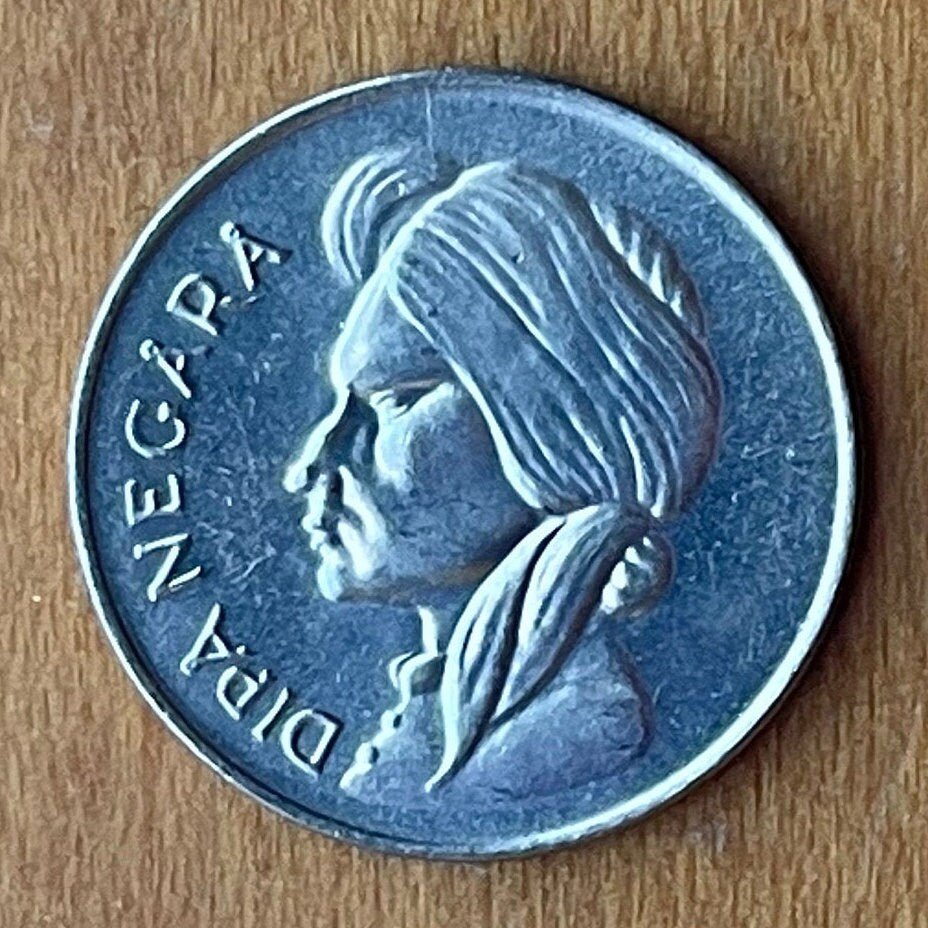elemintalshop
Prince Dipanegara 50 Sen Authentic Coin Money for Jewelry and Craft Making (Diponegoro)
Prince Dipanegara 50 Sen Authentic Coin Money for Jewelry and Craft Making (Diponegoro)
Couldn't load pickup availability
Prince Dipanegara 50 Sen Authentic Coin Money for Jewelry and Craft Making
Obverse: Pangeran Dipanegara facing left
Lettering: DIPA NEGARA
Reverse: Denomination within scalloped design, ornaments flank date below
Lettering: INDONESIA
50 SEN
Features
Issuer Indonesia
Period Republic (1950-date)
Type Standard circulation coin
Years 1954-1957
Value 50 Sen (0.50)
Currency Rupiah (1950-1965)
Composition Copper-nickel (75% Copper, 25% Nickel)
Weight 3.24 g
Diameter 20.0 mm
Shape Round
Technique Milled
Orientation Coin alignment ↑↓
Demonetized Yes
Number N# 7812
References KM# 10, Schön# 8
Wikipedia:
Prince Dipanegara (11 November 1785 – 8 January 1855),[1] also known as Diponegoro, was a Javanese prince who opposed the Dutch colonial rule. The eldest son of the Yogyakartan Sultan Hamengkubuwono III, he played an important role in the Java War between 1825 and 1830. After his defeat and capture, he was exiled to Makassar, where he died.
His five-year struggle against the Dutch control of Java has become celebrated by Indonesians throughout the years, acting as a source of inspiration for the fighters in the Indonesian National Revolution and nationalism in modern-day Indonesia among others. He is a national hero in Indonesia.
*******
The militancy of people's resistance in Java would rise again during the Indonesian Revolution, which saw the country gain independence from the Netherlands. Early Islamist political parties in Indonesia, such as the Masyumi, portrayed Dipanegara's jihad as a part of the Indonesian national struggle and by extension Islam as a prominent player in the formation of the country.
During the Royal Netherlands state visit to Indonesia in March 2020, King Willem-Alexander returned the kris of Prince Dipanegara to Indonesia, received by President Joko Widodo. His kris was long considered lost, but has now been found, after being identified by the Dutch National Museum of Ethnology in Leiden. The kris of Prince Dipanegara represents a historic importance, as a symbol of Indonesian heroic resilience and the nation's struggle for independence. The extraordinary gold-inlaid Javanese dagger previously was held as the Dutch state collection, and is now part of the collection of the Indonesian National Museum.
Share



















